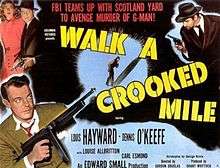Walk a Crooked Mile
Walk a Crooked Mile is a 1948 anti-communist film noir crime film directed by Gordon Douglas and starring Louis Hayward and Dennis O'Keefe.
| Walk a Crooked Mile | |
|---|---|
 Theatrical release lobby card | |
| Directed by | Gordon Douglas |
| Produced by | |
| Screenplay by | George Bruce |
| Story by | Bertram Millhauser |
| Starring | |
| Narrated by | Reed Hadley |
| Music by | Paul Sawtell |
| Cinematography |
|
| Edited by | James E. Newcom |
Production company | Edward Small Productions |
| Distributed by | Columbia Pictures |
Release date |
|
Running time | 91 minutes |
| Country | United States |
| Language | English |
Premise
A communist spy ring has infiltrated Lakeview Laboratory of Nuclear Physics, a Southern California atomic research center. Scotland Yard detective Philip Grayson (Louis Hayward) and FBI agent Dan O'Hara (Dennis O'Keefe) are on the case.
Cast
- Louis Hayward as Philip 'Scotty' Grayson
- Dennis O'Keefe as Daniel F. O'Hara
- Louise Allbritton as Dr. Toni Neva
- Carl Esmond as Dr. Ritter von Stolb
- Onslow Stevens as Igor Braun
- Raymond Burr as Krebs
- Art Baker as Dr. Frederick Townsend
- Lowell Gilmore as Dr. William Forrest
- Philip Van Zandt as Anton Radchek
- Charles Evans as Dr. Homer Allen
- Frank Ferguson as Carl Bemish
- Reed Hadley as Narrator
Production
The film was originally titled FBI vs Scotland Yard but this was changed at the request of J. Edgar Hoover.[1]
Reception
When the film was released, The New York Times film critic, Bosley Crowther, while giving the film mixed review, wrote well of the screenplay, "No use to speak of the action or the acting. It's strictly routine. But the plot is deliberately sensational."[2]
The staff at Variety gave the film a favorable review, writing, "Action swings to San Francisco and back to the southland, punching hard all the time under the knowledgeable direction of Gordon Douglas. On-the-site filming of locales adds authenticity. George Bruce has loaded his script with nifty twists that add air of reality to the meller doings in the Bertram Millhauser story. Dialog is good and situations believably developed, even the highly contrived melodramatic finale. Documentary flavor is forwarded by Reed Hadley's credible narration chore."[3]
References
- Scheuer, Philip K. (Aug 23, 1948). "Dennis O'Keefe Costar of Small's 'Dark Page;' Carmen, Wally Reunited". Los Angeles Times. p. 11.
- Crowther, Bosly. The New York Times, film review, October 13, 1948. Last accessed: February 27, 2011.
- Variety, film review. September 2, 1949. Last accessed: February 27, 2011.